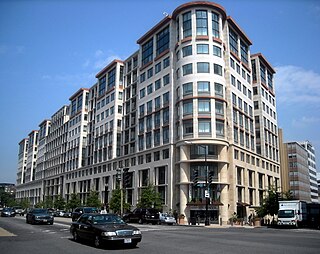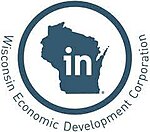
The International Finance Corporation (IFC) is an international financial institution that offers investment, advisory, and asset-management services to encourage private-sector development in less developed countries. The IFC is a member of the World Bank Group and is headquartered in Washington, D.C. in the United States.
The Baltimore Development Corporation (BDC) is a nonprofit corporation and public-private agency contracted by the City of Baltimore to promote economic development.

Scott Kevin Walker is an American politician who served as the 45th governor of Wisconsin from 2011 to 2019. A member of the Republican Party, he previously served as Milwaukee County executive from 2002 to 2010.

Peter William Barca is an American Democratic politician from Kenosha, Wisconsin. He was the 14th secretary of the Wisconsin Department of Revenue (2019–2024) in the administration of Governor Tony Evers. He is a candidate for U.S. House of Representatives in Wisconsin's 1st congressional district in 2024; he previously represented the district during the 103rd Congress (1993–1995).
The Commodity Credit Corporation (CCC) is a wholly owned United States government corporation that was created in 1933 to "stabilize, support, and protect farm income and prices". The CCC is authorized to buy, sell, lend, make payments, and engage in other activities for the purpose of increasing production, stabilizing prices, assuring adequate supplies, and facilitating the efficient marketing of agricultural commodities.
A tax incentive is an aspect of a government's taxation policy designed to incentivize or encourage a particular economic activity by reducing tax payments.

The U.S. African Development Foundation (USADF) is an independent U.S. government agency established by Congress in 1980 to invest directly in African grassroots enterprises and social entrepreneurs. USADF's investments aim to increase incomes, revenues, and jobs by promoting self-reliance and market-based solutions to poverty. USADF targets marginalized populations and underserved communities in the Sahel, Great Lakes, and the Horn of Africa. It partners with African governments, other U.S. government agencies, private corporations, and foundations to achieve transformative results.
The Canadian Scientific Research and Experimental Development Tax Incentive Program provides support in the form of tax credits and/or refunds, to corporations, partnerships or individuals who conduct scientific research or experimental development in Canada.

The Oklahoma Housing Finance Agency (OHFA) is a non-profit organization which serves the people of Oklahoma by offering affordable housing resources, including loans and rent assistance. OHFA was created in 1975 when Governor of Oklahoma David L. Boren approved the agency's first trust indenture. OHFA is a public trust with the State of Oklahoma as the beneficiary. The Trust was established to better the housing stock and the housing conditions in the State of Oklahoma and administers the Section 8 housing program along with other housing programs for the State.

The Georgia Department of Economic Development (GDEcD) is a department of the state of Georgia, United States. The GDEcD is responsible for managing resources to attract new business investments to Georgia, expand Georgia's existing industries and businesses, locate new markets for Georgian products, and promote and fund entertainment projects produced in the state.

The Wisconsin Department of Revenue (DOR) is an agency of the Wisconsin state government responsible for the administration of all tax laws, as well as valuing property and overseeing the wholesale distribution of alcoholic beverages and enforcement of liquor laws. The Department also administers the state's unclaimed property program and the state lottery.
The official history of motion picture production in the U.S. state of Michigan dates back to the beginning of the Post–World War II baby boom. As of March 14, 2013, the Michigan Film Office website contains a list of 319, filmed in Michigan titles, beginning with This Time for Keeps, starring Esther Williams and in 1946, followed by Anatomy of a Murder, starring Jimmy Stewart and Lee Remick in 1959. Contemporary nationally known works filmed in the state include the drama Conviction (2010), starring Hilary Swank and Sam Rockwell, Kill the Irishman (2011), starring Val Kilmer and Christopher Walken, HBO's series Hung was filmed, and is set in, Detroit, and the Discovery Channel's Motor City Motors (2009), formerly Monster Garage (2002-2006). Originally slated for Minneapolis, Minnesota, Clint Eastwood's film Gran Torino (2008) was filmed in the Detroit area.
Pennsylvania Department of Community and Economic Development is a cabinet-level state agency in Pennsylvania. The mission of the department is to enhance investment opportunities for businesses and to improve the quality of life for residents. The department works to attract outside corporations, spur expansion of existing local employers, and foster start-ups by providing tax incentives and technical assistance. Additionally, the agency provides grant funding to community groups and local governments for projects such as revitalizing "Main Street" infrastructure, enhancing low income housing availability, or improving access to technology.

The Kestrel K-350 or Kestrel is a high-performance, single engine turboprop, all-composite, six-seat aircraft.

Movie production incentives are tax incentives offered on a state-by-state basis throughout the United States to encourage in-state film production. Since the 1990s, states have offered increasingly competitive incentives to lure productions away from other states. The structure, type, and size of the incentives vary from state to state. Many include tax credits and exemptions, and other incentive packages include cash grants, fee-free locations, or other perks.
Fiscal policy are "measures employed by governments to stabilize the economy, specifically by manipulating the levels and allocations of taxes and government expenditures". In the Philippines, this is characterized by continuous and increasing levels of debt and budget deficits, though there were improvements in the last few years of the first decade of the 21st century.
The Texas State Affordable Housing Corporation (TSAHC) is a nonprofit affordable housing provider in Texas.

The Community Renewal Tax Relief Act of 2000 is a bill that was introduced into the United States House of Representatives during the 106th United States Congress. The Act was eventually passed as part of the Consolidated Appropriations Act, 2001.

BrightStar Wisconsin Foundation Inc. is a Milwaukee, Wisconsin based non-profit that was formed by angel investor Tom Shannon and seven additional founding donors. It is a means of economic development by members of the state's private sector. "BrightStar was formed for the purpose of assisting WEDC in its mission to create family-sustaining jobs in the Wisconsin."

The Wisconn Valley Science and Technology Park was developed when Foxconn committed to investing $10 billion in a display panel manufacturing plant in Mount Pleasant, Wisconsin per an agreement with the state of Wisconsin. The initial announcement claimed that the site would employ up to 13,000 workers and that the company would receive $3 billion in subsidies. The factory was to start production by the end of 2020. State and local governments made substantial infrastructure improvements.













